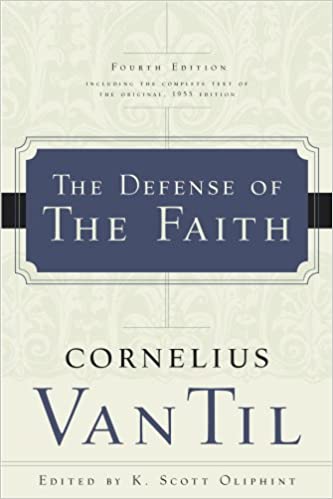A Brief Book Summary from Books At a Glance
By Steve West
About the Author
Cornelius Van Til (1895-1987) earned his PhD from Princeton University. He briefly taught apologetics at Princeton before moving to Westminster Theological Seminary, where he was a professor for decades. Van Til authored many books and is considered the founder of presuppositionalism.
Introduction
The Defense of the Faith is an essential read for anyone interested in Van Til’s thought. It presents his presuppositional approach to apologetics, as well as interacts with thinkers who hold to other positions. Van Til argues that Reformed apologetics must be faithful to the principles of Reformed theology, and that presuppositionalism is the methodology that accomplishes this.
Table of Contents
Chapter 1 Christian Theology
Chapter 2 The Christian Philosophy of Reality
Chapter 3 The Christian Philosophy of Knowledge
Chapter 4 The Christian Philosophy of Behavior
Chapter 5 Christian Apologetics (Point of Contact)
Chapter 6 Christian Apologetics (The Problem of Method)
Chapter 7 Christian Apologetics (Authority and Reason)
Chapter 8 Common Grace and Scholasticism
Chapter 9 Argument by Presupposition
Chapter 10 The Defense of Christianity
Chapter 11 Amsterdam and Old Princeton
Summary
Chapter 1: Christian Theology
We must get our system of theology and doctrinal understanding from the content of Scripture. It is impossible to defend the historical fact of Christ’s resurrection without defending the Christian concept of theism and Christian philosophy. We do not, however, begin to reason about Christianity and defend the faith apart from the Bible. Scripture not only contains historical facts, it contains the only workable philosophy of history.
In order to defend Christianity, we first need to know what the main doctrines of the faith are. The doctrine of God is of primary importance. He is independent, immutable, absolute, infinite, and one. His incommunicable attributes stress his transcendence, and his communicable attributes stress his immanence. We may summarize by saying that God is an absolute personality. It is critical that we recognize that he is also triune. Human beings are created in the image of God and are therefore as like God as created beings can be.
Human beings are finite, and there will always be much of the universe that is mysterious for us. When Adam fell into sin, he tried to act completely as God, rather than retain his position in the created order. He tried to set himself up as one who was comprehensive in knowledge. To reconcile sinners back to God, the second person in the trinity became incarnate. Christ was fully God and fully man, and fulfilled the offices of prophet, priest, and king. To save us, Christ needs to accomplish salvation for us and also work in us. By the Spirit, the sinner is regenerated so they can trust Christ. In eternity past, God elected people for salvation, and the total number of the elect is the Church. Since all of history unfolds according to God’s plan, where he has revealed the future, we can know what it will contain. Part of what he has revealed is the new heavens and new earth, the home of righteous.
Chapter 2: The Christian Philosophy of Reality
In order to communicate with people who are not interested in theological concepts, we need to use the language of the philosophers to connect with them. Yet we must ensure that we invest philosophical vocabulary with Christian meaning. Human beings try to find the relationship between plurality and unity; the problem of the One-and-Many is vital. In God—since he is triune—the one and the many are equally ultimate from eternity. Philosophers cannot help either losing particularity or unity unless they appeal to the triune God: he is the concrete (rather than abstract) universal.
[To continue reading this summary, please see below....]The remainder of this article is premium content. Become a member to continue reading.
Already have an account? Sign In
Buy the books

THE DEFENSE OF THE FAITH, by Cornelius Van Til